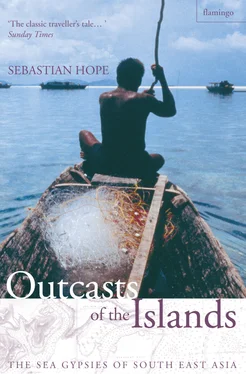‘We will go over there, sana , and put down the net,’ and we resumed our lugubrious progress. The tranquillity seeped into my body, the heat, the rhythm of the pole moving us forward in spurts, each thrust like a slow pulse, the water in the dug-out washing back and forth, rushing towards Sarani as he pushed on the pole and the bow dipped, flowing back between strokes. I timed my baling to coincide with the flood at my feet. The crab went over the side. I felt like a young boy given a simple task vital to the enterprise, given a stake in it.
Sarani talked. ‘That’s Si Amil. You can’t see Danawan, but it’s only as far away from Si Amil as we are from the boat now. When we came from Bongao we stayed at Danawan for a time. We were three boats, three motor . We had not used lépa-lépa for a long time already, although I was born on one and I have built more than ten in my life. Pilar was still small, but his older brother Sabung Lani was already married and had his own boat. There were many Bajau Laut there already, and many House Bajau in the village. There used to be many fish too, but then people started using fish-bombs.’ (The phrase main bom , ‘playing bombs’, like main futbol or main badminton .) ‘Suluk people. Bajau Laut people only use nets and spears. We are frightened to use bombs. They’re dangerous and illegal. Now there are no big fish left at Danawan. We were the first to come to Mabul, and then other boats, and then the people in the village and now kurang ikan , few fish’ ( kurang can also mean ‘not enough’). ‘We will put the net down here.’
Sarani found the end of the net, a monofilament gill net about four feet deep, and snagged it on a coral head using his pole. Propelling the boat with one hand, he teased out the mesh with the other. ‘It’s going to rain,’ he said, and pointed with the pole to the dark clouds rolling off the hills of the distant mainland.
‘My first wife was still alive when we came to Danawan. We already had seven children, well, eight, but one died in the Philippines when still a child. Take the net off that snag, can you? She is buried in Labuan Haji, on Bum Bum. She had family there. When Pilar got married I could have stayed with him, but a young couple should have their own boat. So I built another boat and got married myself. Why not? I was still strong, for pulling up nets, for playing love, main cinta .’ I watched the muscles working across his shoulders, baked dark chocolate, his sturdy body and powerful limbs. He was still strong, his fingers thick and worn, his feet broad, their soles bleached by salt water. ‘It is unusual for someone already old to marry a young woman, but I knew Minehanga’s father and he said yes, though only if she said yes. I paid a higher bride price, about sixteen hundred ringgit (£400), some cash, some in goods – rice, salt, cloth, tobacco. What is the bride price in your country? You don’t have one?’ and when I explained the old custom of the dowry he let out a long ‘oi’ in surprise. ‘Good, if you’re a boy. This boy getting married tonight, his family have paid one thousand ringgit, twelve hundred maybe, to the father of the bride. Here, it’s good to have daughters.’ He paid out the last of the net. A lump of polystyrene went over the side to act as a marker. We drifted away from it as Sarani prepared another plug of betel. We turned and backtracked slowly along the length of the net some ten yards away from its line of floats and Sarani rattled the pole underneath the coral heads to frighten fish towards it. Shapes of fish shot away from the stick, and sometimes their flight was stopped abruptly by a wall of monofilament. We turned again at the anchored end, turned towards the mainland. The clouds were over the sea and the patterns of the rain showed on its surface. ‘It’s going to rain, soon,’ said Sarani as he put on a pair of goggles, made of wooden frames and window glass, and slipped over the side.
He started to swim back along the net, his face under water, pulling the dug-out behind him. He ducked down, the white soles of his feet kicking at the surface. His head came up, as smooth as an otter. He clutched a fish in his hands which he threw into the boat, followed by another. A pair of goatfish flipped around at my feet. They raised and lowered spiny dorsal fins. The large scales of their flanks were nacreous below a black lateral line, a black dot near the tail, and above were shaded yellow. I watched them dying and remembered the colours of mackerel fresh-caught, the moment of regret, and as the goatfish weakened, a colour the shade of pomegranates seeped over them as though their scales were blotting paper. The sky ahead was purple now, but we were still in sunshine, lighting the turquoise shallows, turning the emerging sands of Kapalai into a bar of pale gold. The colours were so intense, the crimson fish against wet wood, Sarani’s brown back in the turquoise water. A wrasse landed in the boat, bright blue spots, ringed with black, on a chocolate brown field, a triggerfish, back half yellow, front half black, that seemed to talk, tok tok tok tok . More blushing goatfish, as the first two faded to grey, even the black markings only just visible, as though their normal coloration had been sustained only by an act of will. A polka-dot grouper and a parrotfish, lime green with purple trim. ‘ Kurang ikan ,’ said Sarani and he climbed back into the boat. We pulled up the net in the rain.
The wind had brought us the sound of it, white noise hissing across the sea. The light became livid, the colours dead. Kapalai disappeared, drenched behind a curtain of rain which we watched sweep on towards us across the shallows, seemingly solid. In its midst the wind was chill and the noise ended conversation. Water ran from my head in streams. The surface of the sea seemed to pop with pearls, the drops rebounding. And then it had passed and we could not see Sipadan any more. Sarani unsnagged the end of the net and began to propel us towards a deeper part of the reef; the hull of the canoe was beginning to catch on the larger coral heads.
‘There are lots of fish at Sipadan, big fish, turtles, but we do not go there any more. It is not allowed, not since the resorts came. No one can fish there. We cannot go close. Do the tourists take the fish when they are diving? They are also not allowed? Hmm. They only look? Why? You do not have these things in your country? What is it like then?’ and I told him about cold, coral-less seas, rocky coasts and kelp forests, islands that have no palm trees and see snow in the winter. ‘Ice from the clouds? And the girls must pay for the boys? What a strange place.’ Sarani paid out the net again.
As soon as the storm had passed I could see a small flotilla of pump-boats streaming across the open sea from the direction of Bum Bum. They grouped at the far edge of the reef, six of them, two figures in each boat, and spread themselves out around the drop-off. I thought nothing more of them, fishermen. The net was down and Sarani was back in the water looking for shellfish. Cone shells – dolen – came over the side, lambis shells, kahanga , that look like one half of a Venus fly-trap, a pink-slitted hollow with five delicate tusks curving out from its lip. They landed higgledy-piggledy, but after a while the pile began to move as the molluscs tried to right themselves. A long, red-brown claw emerged from the slit, and a pale olive mantle flecked with white unfurled over the smooth inner surfaces. Horns poked out. The claw slipped round the edge of the shell and hooked powerfully, looking for a purchase. Those that were the right way up were dragging themselves along the bottom of the boat, mingling with the dying fish. Sarani collected sea-urchins too, téhé-téhé , not the vicious black ones with eight-inch spines whose tips break off in a wound, but ones no more prickly than a hedgehog, with feelers between the short spines that attached themselves to the palm of my hand. The bottom of the dug-out was beginning to look like an aquarium. Sarani found a large clam and set about opening it on the spot. He smashed an opening with the blunt edge of his parang, cut the muscle holding the halves of the shell closed, and quartered the contents. ‘ Kima ,’ he said. ‘It’s delicious, if you have some lemon juice, some chilli, some vinegar, some garlic, some Aji No Moto.’ (Sarani used the local brand name for monosodium glutamate.) It was better without, tougher than an oyster, and as salt as the sea.
Читать дальше












